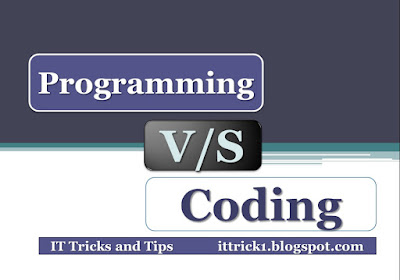Programming vs Coding | Difference between programming and coding
 |
| Programming vs coding | difference between programming and coding |
Introduction:
Most of the time we mix coding and programming. We consider
coding and programming is the same term. Actually, there is a huge difference
between coding and programming. This is a comparative article it compares
programming with coding. In this article
I will explain programming vs coding in the following aspects:
- Definition
- Importance
- Coding is an Initial part of programming
- Efficiency
- Simplicity
- Skills
- How both works?
- Programming v/s coding with respect to function:
- Pair programming
Basic definition:
Coding |
|
Design to syntax (line of code) for a program
is called coding.
|
Design to program for a specific function or the output is called programming.
|
Above was the difference between the basic definition of
coding and programming.
Importance:
Basically coding and programming both are most
important for the advanced study of computer.
While according necessity coding
is important than programming.
|
Programming is the second step after coding. No
doubt programming is efficient, it is used from computer window to in jet F17.
But it is least important than coding.
|
Coding as an initial step of programming:
Coding is an
initial step for computer programming.
For example: If you are Owner of a company, and you want to implement a
rule in the company, so what material is required: a paper, a pen, a Paragraph, and
your signature. So let’s consider this paragraph is programming for your computer
then each sentence of this paragraph will a code. We can conclude that code is
a basic unit of a program.
The efficiency of programming:
Programming is more efficient than coding (Basic Machine
coding). Programming deals with a project, while coding does not. According to a
calculation there are about 18.5 million peoples are programmer while 21
millions of peoples are coders.
Simplicity:
If the discussion is about the simplicity of coding and
programming than I think coding is simple than programming. Because in the code you
are dealing with only one line while in programming you are dealing with
thousands of lines.
Skills:
A programmer is a coder while coder cannot be a
programmer. Both terms are mutually interlinked with each other. Coding is
simple than programming, so it does not require a lot of skills.
How a code and program work:
As we know
that program is a group of codes that are arranged in a specific sequence to
perform the desired function. That is called a project.
If coding is
not true then the program cannot perform a function.
A code may
or may not perform any function. But a program gives output always. The fate of the code may be in two phases on IDLE:
- Coding
- Running
But the program always passes from three phases:
- Coding
- Running
- Giving Output
Program v/s coding with respect to functioning:
As we know
that only program gives function. It may be a mini-program (In your computer
IDLE) may be a mega program (in Google’s IDLE). In both conditions the program gives
output. The program used for function. And for this legendary work of programming, a
programmer should be a coder.
Pair programming:
Let’s
discuss another example for the conclusion of programming vs coding:
Pair
programming: Two programmers work in this type of programming at same IDLE (it is
done for megaprojects).
One program
functions while others check the codes, is it true or not?
Conclusion:
In the end, we
conclude that programming and coding are not the same terms. Designing of syntax is
coding while designing of function is called programming. Coding is more
important than programming. Acutely coding is an initial part of programming,
programming is used for mega projects on the other hand coding is used for this
programming. For example in pair programming:
A coder and a program work together. As if we can say that
programming is difficult than coding, because coding may deal with only one
language while programming always deals with more than one languages.












No comments
Note: Only a member of this blog may post a comment.